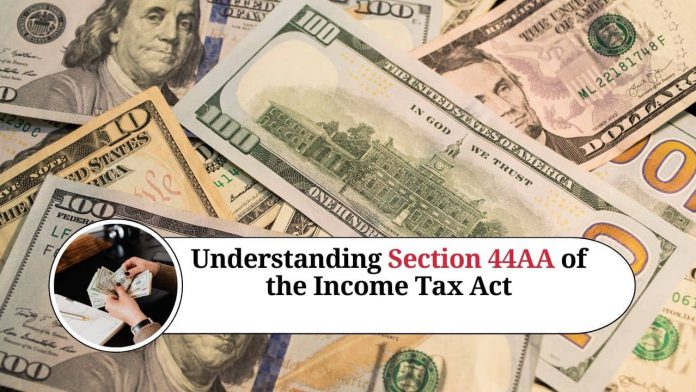The Income Tax Act, 1961, is a crucial legislation that governs taxation in India. Section 44AA of the Income Tax Act is one of the essential provisions that deals with the maintenance of books of accounts by certain taxpayers. This section is significant as it lays down the requirements for maintaining proper books of accounts and the consequences of failing to do so.
What is Section 44AA of the Income Tax Act?
Section 44AA of the Income Tax Act lays down the requirements for maintaining books of accounts by certain categories of taxpayers. This provision mandates that a person carrying on certain businesses or professions must maintain books of accounts. The primary objective of this section is to ensure that accurate financial information is available to the taxpayer and the tax authorities.
Who is required to maintain books of accounts under Section 44AA?
As per Section 44AA, the following categories of taxpayers are required to maintain books of accounts:
- Businesses: Any person carrying on a business, whether sole proprietorship, partnership, or a company, is required to maintain books of accounts.
- Professionals: Professionals such as doctors, lawyers, engineers, architects, and accountants are required to maintain books of accounts if their gross receipts exceed Rs. 1,50,000 in any of the three preceding financial years.
What are the books of accounts that must be maintained?
Section 44AA mandates that certain books of accounts must be maintained by taxpayers who fall under its purview. These include:
- Cash Book: A cash book must be maintained to record all cash receipts and payments made by the taxpayer.
- Journal: A journal must be maintained to record all non-cash transactions such as sales, purchases, and expenses.
- Ledger: A ledger must be maintained to record all transactions that are recorded in the cash book and the journal.
- Copies of bills and receipts: Copies of bills and receipts must be maintained to substantiate the entries made in the books of accounts.
- Inventory Records: Inventory records must be maintained to record all purchases and sales of goods.
What are the consequences of not maintaining books of accounts?
Failure to maintain books of accounts can lead to several consequences under the Income Tax Act. These include:
- Penalty: If a taxpayer who is required to maintain books of accounts fails to do so, a penalty of Rs. 25,000 can be levied.
- Disallowance of expenses: If a taxpayer is unable to produce books of accounts, the tax authorities can disallow the expenses claimed by the taxpayer.
- Reassessment: The tax authorities can initiate a reassessment of the taxpayer’s income if books of accounts are not maintained.
Conclusion:
In conclusion, Section 44AA of the Income Tax Act is a crucial provision that requires certain categories of taxpayers to maintain books of accounts. Maintaining proper books of accounts is not only a legal requirement but also helps taxpayers in managing their finances effectively. It is imperative that taxpayers comply with the provisions of Section 44AA to avoid penalties and other consequences under the Income Tax Act.
Read more useful content:
Frequently Asked Questions
Q: What is 44AA of the Income Tax Act? A: Section 44AA of the Income Tax Act prescribes the mandatory maintenance of books of accounts by certain categories of taxpayers.
Q: Who is required to maintain books of accounts under Section 44AA? A: All persons carrying on business or profession, except those covered under the presumptive taxation scheme of Section 44AD, Section 44ADA or Section 44AE, are required to maintain books of accounts.
Q: What are the books of accounts that need to be maintained under Section 44AA? A: The books of accounts that need to be maintained under Section 44AA are cash book, journal, ledger, copies of bills and receipts, and a statement of inventory.
Q: What is the penalty for not maintaining books of accounts under Section 44AA? A: Failure to maintain books of accounts as required under Section 44AA can attract a penalty of Rs. 25,000.
Q: Is there any exemption from maintaining books of accounts under Section 44AA? A: Yes, certain categories of taxpayers are exempt from maintaining books of accounts under Section 44AA, including individuals, HUFs, and partnership firms whose turnover or gross receipts do not exceed Rs. 2,50,000 or Rs. 25,00,000, as applicable.
Q: What is the due date for maintaining books of accounts under Section 44AA? A: Books of accounts must be maintained throughout the year, and the taxpayer must get them audited before the due date of filing the tax return, which is usually 30th September of the relevant assessment year.
Q: Can books of accounts be maintained in electronic form under Section 44AA? A: Yes, books of accounts can be maintained in electronic form under Section 44AA, subject to compliance with the prescribed rules.
Q: Can a taxpayer opt for presumptive taxation scheme under Section 44AD and still maintain books of accounts under Section 44AA? A: No, a taxpayer who opts for the presumptive taxation scheme under Section 44AD is not required to maintain books of accounts under Section 44AA.




















